Конспект урока для 11 класса «What Russian Films Do You Like Best?»
 Конспект урока английского языка
Конспект урока английского языка
Учитель английского языка Алейникова Анна Николаевна
Тема: «What Russian Films Do You Like Best?»
Класс: 11
Дидактическое обоснование занятия
Задачи:
развивать устную речь по теме на основе прочитанного и прослушанного текстов;
повысить интерес учащихся к предметам ( английский язык, литература, информатика);
совершенствование навыков чтения с полным пониманием прочитанного, овладение дополнительной лексикой по теме, развитие умения определять правильную лексико-грамматическую форму слова.
Цели урока:
Развитие речевой компетенции:
развитие коммуникативных способностей учащихся на основе монологических и диалогических высказываний по теме «What Russian Films Do You Like Best» в форме дискуссии;
развитие коммуникативных способностей учащихся;
развитие навыков вопросно-ответной работы;
более совершенное овладение лексикой и грамматикой по темам «Кино» и «Наречия меры и степени с прилагательными» через выполнение условно-речевых и полифункциональных упражнений;
Развитие языковой компетенции:
введение новой лексики, развитие навыков диалогической речи; развивать устную речь по теме на основе прочитанного и прослушанного текстов;
развитие оценочных суждений (умения давать оценку художественному фильму), коммуникативных умений (умения вести диалог-расспрос и диалог — побуждение к действию), способности осуществлять репродуктивные и продуктивные речевые действия (составлять предложения с данными словами, диалоги с данными вопросами, рассказывать о любимых фильмах);
адекватное произношение и различие на слух всех звуков иностранного языка;
закрепить слова и выражения по данной теме
Социокультурная компетенция:
знакомство с классикой отечественного кинематографа, лучшими российскими и советскими фильмами разных жанров, их сюжетами, переводом их названий на английский язык; развитие воображения, умения высказывать свою точку зрения, личное отношение к поставленной проблеме;
поддержание интереса к отечественному кинематографу, приобщение к классическим фильмам и книгам, формирование способности к пониманию их проблематики;
Развитие компенсаторной компетенции:
готовность и умение осуществлять индивидуальную и совместную работу;
умение выходить из трудного положения в условиях дефицита языковых средств при получении информации за счет использования контекстуальной догадки ,игнорирования языковых трудностей, переспроса, словарных замен, жестов, мимики.
воспитание толерантного отношения учащихся друг к другу способности к сотрудничеству и умению общаться;
воспитание современного образованного человека.
Метапредметные результаты:
развитие творческих навыков (дизайн, иллюстрирование и др.) ;
воспитание грамотных пользователей ПК;
воспитание бережливого отношения к технике.
Методы:
• по характеру познавательной деятельности: репродуктивный, частично-поисковый;
• по степени активности: конструктивные, творческие
• по источнику знаний: словесные, практические, наглядные, использование ПК;
• стимулирования и мотивации: познавательные, социальные, эмоциональные;
• мыслительной деятельности: аналитические, сравнения, классификации материала;
• контроля и самоконтроля: устный, письменный;
• по организации деятельности: индивидуальные, групповые, фронтальные.
Тип урока: урок совершенствования лексико-грамматических навыков.
Оборудование:
интерактивная доска, учебники и книги для чтения к учебникам, распечатанный текст для чтения ”MyFavouriteRussianFilms”, на другой стороне листа - учебный текст “CinemainRussia” (в качестве дополнительного упражнения), слайды по теме для интерактивной доски, мультимедийный проектор.
Межпредметные связи:
• информатика,
• русский язык,
. литература;
• английский язык.
Ход урока:
I Organization … Warming-up: Let's review the vocabulary and the notions of the previous lesson. Try to define the following genres in your own words (see SB page 191 for help):
Historical films/Detectives/Westerns/Action films/Comedies/Thrillers/Melodramas/
Documentaries/Science fiction films/Cartoons/Horror films/Tragedies/Musical films
II Checking up homework (Reader Unit 6, ex.2 p. 66-67):
You had to read some film reviews from the magazine entertainment and answer some questions on them …
III The topic and the aims of the lesson:
Look at the pictures on the screen and try to guess what we are going to talk about this time.
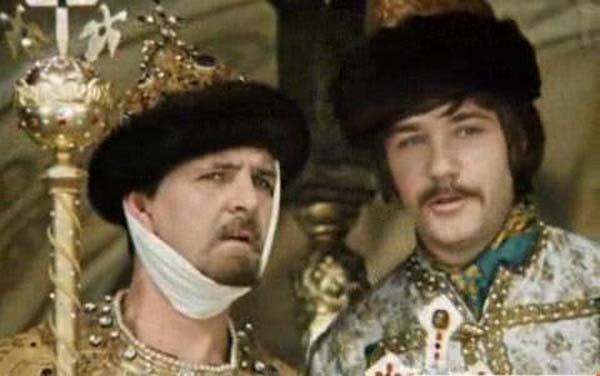
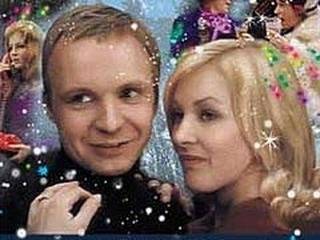
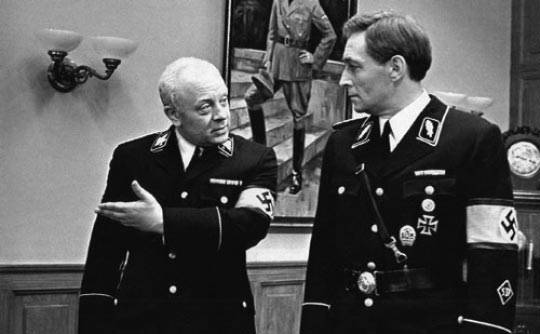
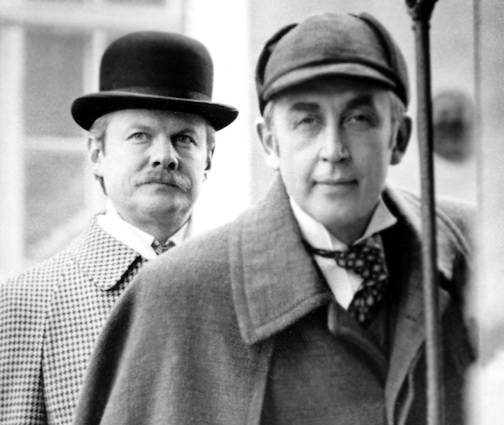
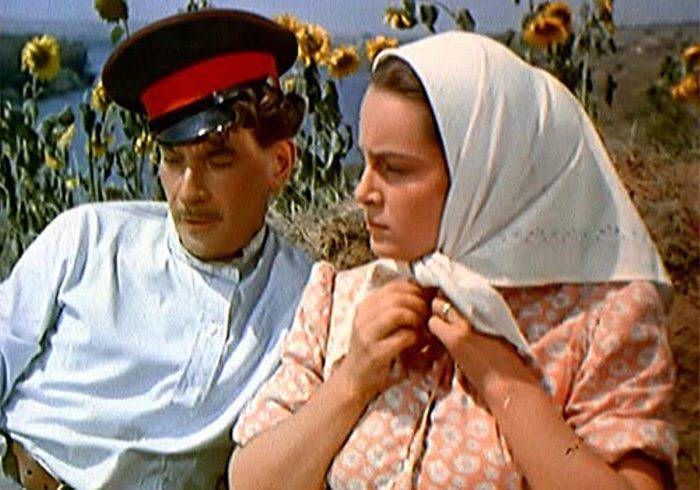
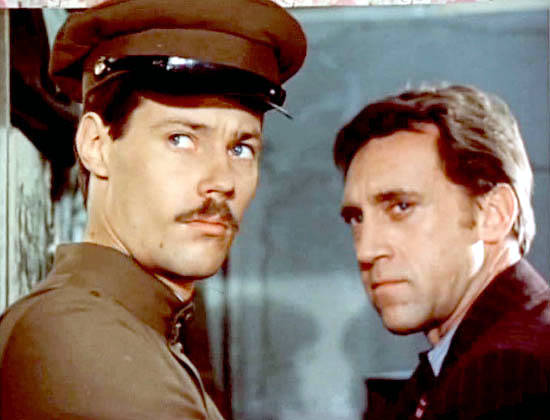
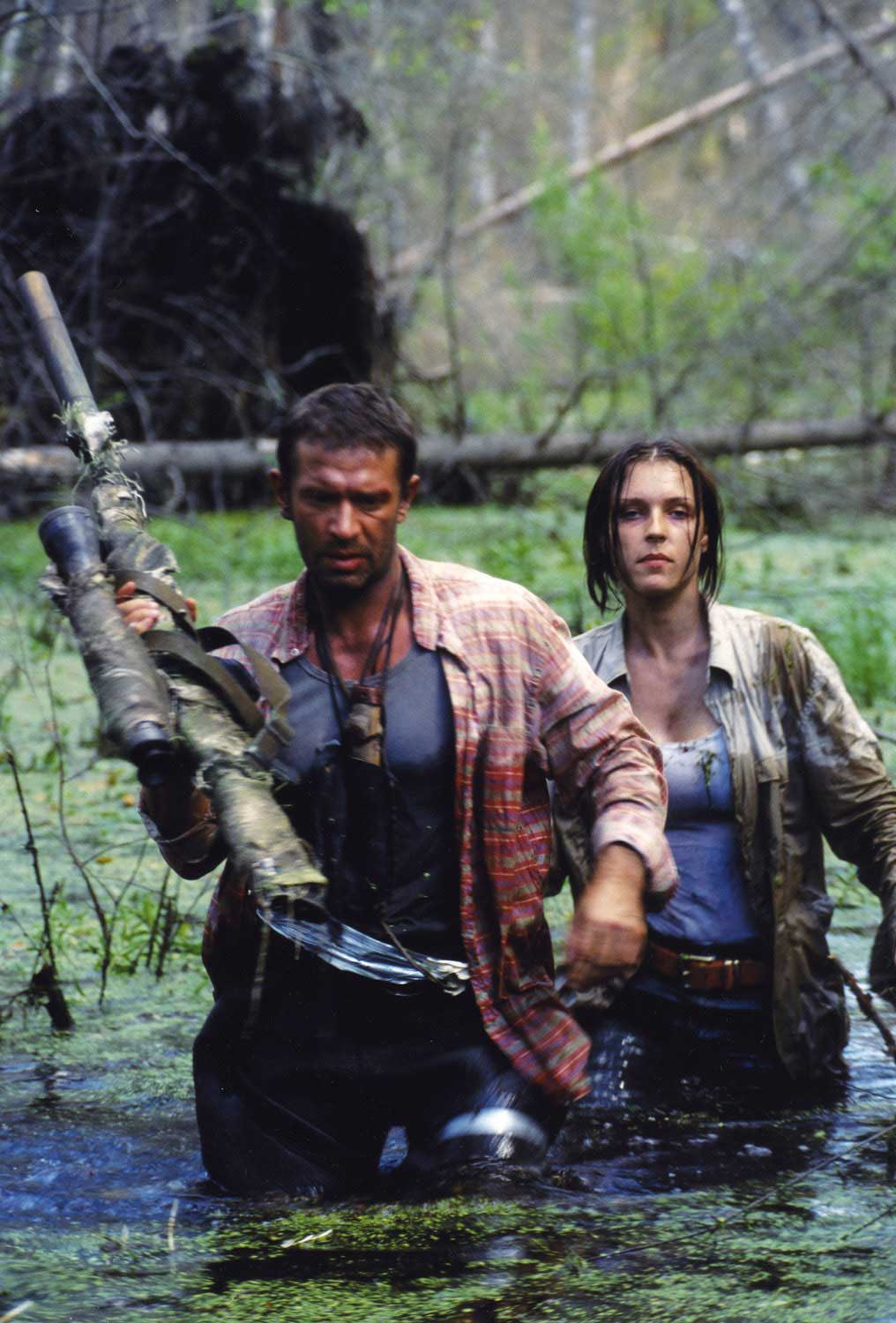
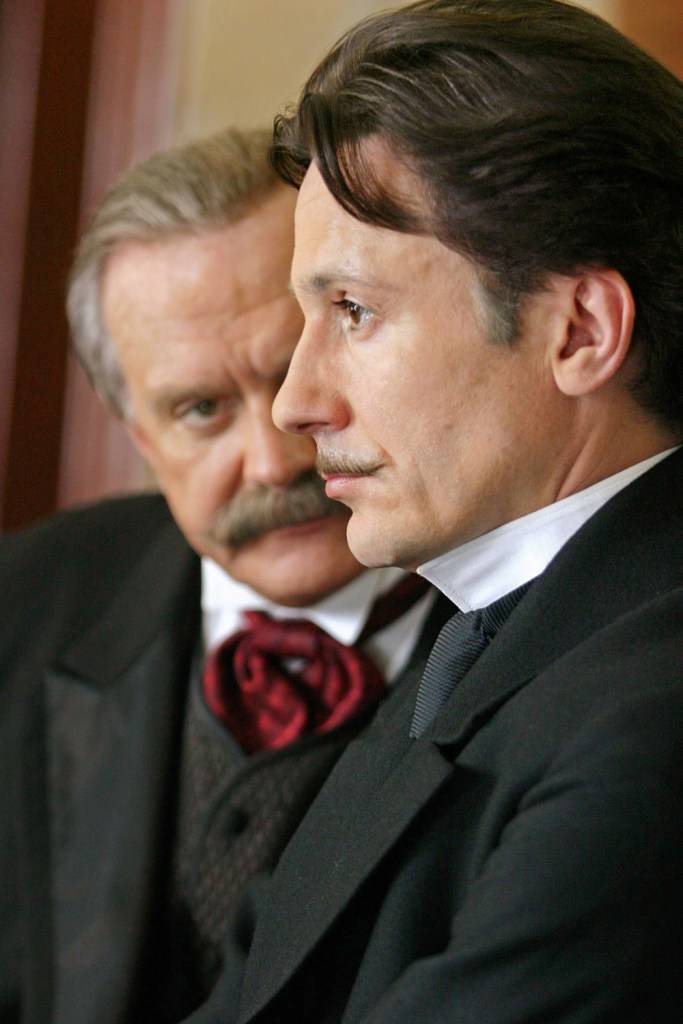
(We are to talk about favourite Russian films, exchange opinions about favourite Russian films, learn how to describe favourite films, how to make a film review.)
Student's Book ex.5(2) p.190 : What Russian films would you advise your foreign friend to see if he/she is interested in detective stories/comedies/historical films? Discuss this question in pairs for 2 minutes …
2. Now I want you to read about some of my favourite Russian films. While reading try to work out a plan of a film review on the example of my texts.
3 students read in English aloud for everybody the following:
My favourite Russian Films.
There are a number of Russian films that I really admire. Some of them are:
SOLARIS («Соляриc» 1972)
It is a Russian film, directed by Andrei Tarkovsky. It is based on the novel of the same name by Polish science fiction author StanislavLem. The film features Natalia Bondarchuk, DanatasBonionis and other actors. Solaris is a science fiction and a psychodrama, that is set mostly on a space station in orbit around the planet like object called “Solaris”. The scientific mission on the space station has fallen into a crisis. Psychologist Kris Kelvin travels to the station to evaluate and explore the situation. Arriving at the station after his journey Kelvin is not met by any of the 3 remaining scientists and finds the space station in dangerous neglect and disarray. He asks questions and finds out that his friend Dr. Gibarian has died mysteriously and the remaining two offer only unhelpful and confusing information. Shortly after being advised by Dr. Snaut not to overreact if he sees anything unusual, he begins to catch glimpses of other people on the station. He begins his investigation against the the swirling background of the ocean like surface of the planet. Soon waking from an exhausted sleep, Kelvin finds a woman in his quarters with him despite his barricaded door. It is his wife Hari, who committed a suicide many years ago. Dr. Snaut explains to him that “visitors” began appearing after the scientists attracted Solaris's attention with their first researches ...
Another film adaptation of this novel by StanislavLem was released in 2002. in this version George Clooney plays the part of Kris Kelvin. Both films are beautifully shot and the acting is perfect. They are both worth seeing. They raise a lot of interesting questions about love, conscience, the nature of humanity and relations with other civilizations. The original version has already become a classic and a lot of people agree that it is much deeper than the American one. This film is not easy to understand, but it really makes you think and it can even make you open the book itself. There is something hypnotizing about this film and I couldn't tear myself away from it.
TEN LITTLE NIGGERS («Десять негритят», 1987)
This film was directed by Stanislav Govorukhin, who also penned the script.
The plot is the following. Ten complete strangers are invited to spend the weekend in a lonely mansion on an island off the English coast. Once there, they realize that none of them know their unseen host, who has identified himself only as "Mr. Owen." Using a prerecorded gramophone, Mr. Owen accuses them each of past murders that the law was unable to punish, and promises swift retribution. Soon thereafter the first guest dies, the victim of poisoning. The remaining guests come to realize that the killer is murdering them according to the old Ten Little Niggers nursery rhyme. When their attempt to locate Mr. Owen by searching the island proves fruitless, they realize that the unknown murderer is in fact one of them.
It is a detective story and a thriller. It's absolutely gripping and extremely psychological. It makes your hair get up on end. No wonder, it is based on Agatha Christie's best-selling novel, which is considered one of the best-selling books of all time.
feature – показывать (на экране), выводить в главной роли
neglectanddisarray – запущенность и беспорядок
overreact – принимать близко к сердцу
catchaglimpse – увидеть мельком, получить некоторое представление
swirl – кружить(ся) в водовороте
exhausted – истощать, изнурять
quarters – помещение, жилище
conscience - совесть
humanity – человечество, человечность
script – сценарий
mansion - особняк
off – дальний, удаленный
retribution — возмездие
nurseryrhyme — детский стишок
gripping — захватывающий
Have you seen these films? What do you think about these films? (would you like to see them?)
Composing and writing down a plan of a film review all together. For example:
1)The name of your fafourite film (Russian or foreign).
2)The genre, the director, the actors.
3)The plot.
4)Your impressions of this film.
3. Discuss your most favourite Russian films in pairs for five minutes. Use the words on page 191 and the following model:
Have you seen …?
...
How do you feel about it? (Really? You should watch this film for sure! It's about … It's one of my fafourite.)
… (Sounds interesting. I'll follow your advice./I don't like such kind of films)
There are also some useful expressions on the screen, that can help you to exchange impressions:
Exchange of Impressions.Обменвпечатлениями.
The pilot of the film is thrilling. – содержаниефильмазахватывающее.
It is beyond comparison! – онвнесравнения!
It is above praise! – онвышевсякихпохвал!
It is worth seeing! - егостоитпосмотреть!
The film is really astonishing! – фильмдействительноизумительный!
The film reflects – вфильмеотражен
The film leaves a deep and lasting impression upon – фильмпроизводитглубокоеи
незабываемоевпечатлениена
to create a true-to-life image – создатьреалистический (правдивый) образ
It appeals to the deep and profound interest – онвызываетглубокийинтерес
The film deals with – вфильмерассказывается
The plot centers around – содержаниефильмасконцентрированона
IV Summarizing our discussion
I'd like to ask you what your most favorite Russian film is (everybody). What conclusions about Russian cinematography can we draw? (It's really great. There are a lot of traditions, brilliant films, actors and directors – a lot of things to be proud of. What can you say about the art of cinematography in general? How can it influence people?
Home assignment for the next lesson: Describe your favourite film Russian or foreign. Do it in writing, using the plan, and learn the description. Be ready to ay about 15 sentences.
V Additional exercise in case.
There are still some minutes left before the bell: fill in the gaps with words in the correct forms.
Orally, the following text is given on paper:
The __________ (spread) of cinematography in Russia started with the demonstration of the Lumiere brothers’ film in May 1896 in St. Petersburg and Moscow and later in Nizhniy Novgorod. This film was called _______________ (arrive) of the Train. The first sound films _______________ (simultaneous) appeared in three countries, the USSR, the USA and Germany at the end of the 1920’s. By 1930 the first sound cinema house ____________ (start) its work.
The first great achievements of Russian cinema ________________ (connect) with its directors such as Eisenstein (The battleship “Potemkin”), Pudovkin (Mother), Dovzhenko (Earth), and others.
Immediately after the end of the Second World War, the Soviet color films such as The Stone Flower (1947), Ballad of Siberia (СказаниеоземлеСибирской, 1947), and The Kuban Cossacks (Кубанскиеказаки, 1949) _____________ (release).
Such feature films as Ballad of a Soldier, Destiny of a Man, Only Old Men Are Going to Battle, The Dawns Here Are Quiet, The Brest Fortress ___________ (consider) to be one of the best films about World War II.
Screen versions of famous novels always _______________ (Be) popular in Russia, for example Aelita (by A. Tolstoi), Solaris (by S. Lem), Seventeen Moments of Spring (by Y. Semyonov), Quiet Flows the Don (by M. Sholokhov), The Count of Monte Cristo (by A. Dumas).
A lot of ______________ (forget) comedies ______________ (shoot) during the 1970s and 1980s, such as Formula of Love, Ivan Vasilievich Changes Profession; Kidnapping, Caucasian Style; Office Romance; The Irony of Fate or Enjoy Your Bath!
Nowadays a large number of films and serials _____________(produce) every year. Popular modern actors and directors contribute to this process.
VI. The results of the lesson .
VII. Homework . Подготовить разработку проекта « Мой любимый фильм»

Нравится материал? Поддержи автора!
Ещё документы из категории английский язык:
Чтобы скачать документ, порекомендуйте, пожалуйста, его своим друзьям в любой соц. сети.
После чего кнопка «СКАЧАТЬ» станет доступной!
Кнопочки находятся чуть ниже. Спасибо!
Кнопки:
Скачать документ